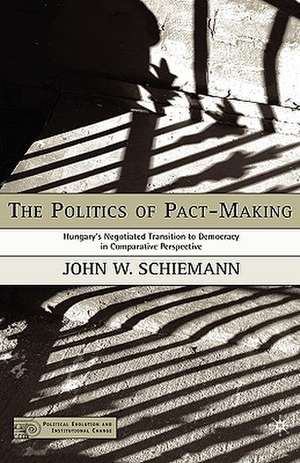The Politics of Pact-Making: Hungary's Negotiated Transition to Democracy in Comparative Perspective: Political Evolution and Institutional Change
Autor J. Schiemannen Limba Engleză Hardback – 13 dec 2005
| Toate formatele și edițiile | Preț | Express |
|---|---|---|
| Paperback (1) | 383.12 lei 6-8 săpt. | |
| Palgrave Macmillan US – 23 dec 2015 | 383.12 lei 6-8 săpt. | |
| Hardback (1) | 388.13 lei 6-8 săpt. | |
| Palgrave Macmillan US – 13 dec 2005 | 388.13 lei 6-8 săpt. |
Preț: 388.13 lei
Nou
Puncte Express: 582
Preț estimativ în valută:
74.27€ • 77.39$ • 61.49£
74.27€ • 77.39$ • 61.49£
Carte tipărită la comandă
Livrare economică 03-17 aprilie
Preluare comenzi: 021 569.72.76
Specificații
ISBN-13: 9781403971098
ISBN-10: 1403971099
Pagini: 240
Ilustrații: XIV, 217 p.
Dimensiuni: 140 x 216 x 19 mm
Greutate: 0.42 kg
Ediția:2005
Editura: Palgrave Macmillan US
Colecția Palgrave Macmillan
Seria Political Evolution and Institutional Change
Locul publicării:New York, United States
ISBN-10: 1403971099
Pagini: 240
Ilustrații: XIV, 217 p.
Dimensiuni: 140 x 216 x 19 mm
Greutate: 0.42 kg
Ediția:2005
Editura: Palgrave Macmillan US
Colecția Palgrave Macmillan
Seria Political Evolution and Institutional Change
Locul publicării:New York, United States
Cuprins
Pact-Making, Bargaining, and Institutional Choice Pact-Making in Hungary: The 1989 Hungarian Roundtable Talks Opposition Intransigence and Risk-Taking: The Presidency Patience and Bargaining Power: The Constitutional Court Incredible Promises and Credible Threats: The Law on Political Parties Comparative Perspectives: South Africa, Poland, and China
Recenzii
"The collapse of the Communist regimes after 1989, the closing of a long historical parenthesis, was a momentous event. In this study of the Hungarian transition John Schiemann offers the first analytical account of one of these processes, with wide implications for transitions more generally. In a compelling picture of bargaining under uncertainty, he shows how differing attitudes to risk rather than conflicting political demands generated the dynamics of the transition. It is a book that should be obligatory reading for students of regime change, who too easily come to see as inevitable what for the actors themselves was a highly contingent set of events. The Hungarian communists may have been moribund, but the world did not know it until they were dead." - Jon Elster, Robert K. Merton Professor of Social Science, Columbia University
'This highly original study adds greatly to our knowledge of pact-making and political bargaining by forcing us to think beyond the categoriess of 'regime' and 'opposition' and recognize that the role of risk-takers and risk-avoiders within each category is pivotal to any outcome. Beginning with meticulous research on the Hungarian case and then expanding to three other cases for a rigorous test of the author's argument, this book solves a key puzzle about who wins and who loses in the bargains that lie at the foundation of failed and successful regime change. This is an enlightening study that truly deserves a wide audience.'
- Nancy Bermeo, Professor of Politics, Princeton University
'This highly original study adds greatly to our knowledge of pact-making and political bargaining by forcing us to think beyond the categoriess of 'regime' and 'opposition' and recognize that the role of risk-takers and risk-avoiders within each category is pivotal to any outcome. Beginning with meticulous research on the Hungarian case and then expanding to three other cases for a rigorous test of the author's argument, this book solves a key puzzle about who wins and who loses in the bargains that lie at the foundation of failed and successful regime change. This is an enlightening study that truly deserves a wide audience.'
- Nancy Bermeo, Professor of Politics, Princeton University
Notă biografică
JOHN SCHIEMANN is an Assistant Professor of Administrative Science at Fairleigh Dickinson University, USA.

























